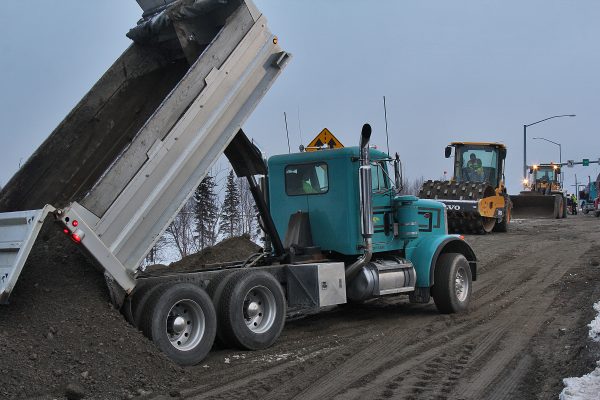
Alaska has been in recession for three years. And, though there are reasons to be optimistic right now, state economist Neal Fried is still not ready to call it’s end. And, he says new economic activity driven by last month’s major earthquake is not going to pull the state out of recession.
COLLINS: Neal, we talked a few months ago about the recession. At that time you said things are looking pretty good. People are feeling pretty optimistic, but you weren’t quite ready to call the end of the recession.
FRIED: I’m still not.
COLLINS: You’re still not.
FRIED: No. By your question, ‘is the recession going to end?’ The answer is it could. I think a lot of people do believe that sometime next year employment could potentially turn positive. And that would sort of signal the possible end of a recession. The losses have moderated considerably. But they’re still not over.
COLLINS: What exactly would it take for you to be confident in saying ‘we’re here, it’s over,’ or, ‘I can see the end’?
FRIED: It’s probably going to be over for a while before we are really going to see it and say it’s over. It’s positive employment growth for a while, for at least a couple of quarters. And, what’s important here is for a lot of people, some people didn’t even go into recession — or certain industries didn’t. Some of them are already out of recession. We were talking earlier about construction. Well, construction is not losing ground anymore, it’s actually growing some. So, they’re not in a recession anymore. They’re not in full recovery by any means. Not anywhere close. But, they’re not in what we call a recession. And there are a lot of industries that are, broadly speaking. There are a lot of places in the state that aren’t in a recession.
COLLINS: We in Anchorage and around Southcentral were rocked by this big earthquake on Friday. Is the earthquake what it will take to get us out of the recession? Could this generate some jobs? What’s your take on that?
FRIED: (laughs) No. I mean it will generate some economic activity. It already is. There’s no doubt about it. If there was the ’64 earthquake the answer would probably be yes. Not that we’d want to with that upon us. Because a lot of losses occur in an earthquake. All this inventory. Some of it won’t be recovered. There’s no doubt it’s going to provide a small boost. And it’s providing a boost to an industry where this is the lowest time of the year. Construction really slows down here in the wintertime. Highway construction is nonexistent usually in the wintertime and look what’s going on. No, I don’t think this will be enough. This is more like, it’s going to just happen sort of slowly and modestly. It’s not going to be some major economic event.
COLLINS: Does that happen, in states that have experienced recession?
FRIED: Some people claim that the ’64 earthquake did that. But I looked at the data, and we were growing before the ’64 earthquake. It certainly caused a lot of economic activity because there was so much destruction. And the federal government did pour a lot of money into Alaska.
This interview is part of a new series addressing economic news and trends in Alaska. If you have question about the economy you’d like answered, email acollins@alaskapublic.org.




